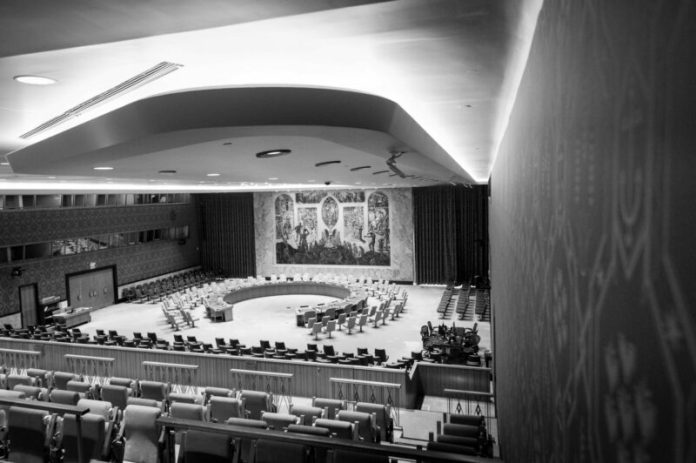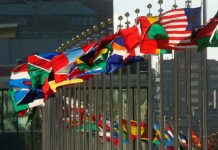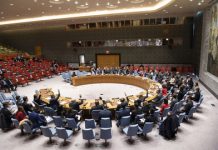“Every fraction of a degree means more hunger, displacement, and loss – especially for those least responsible. It could push ecosystems past irreversible tipping points, expose billions to unlivable conditions, and amplify threats to peace and security,” Mr. Guterres told leaders in Belém.
Failure to contain global heating amounts to “moral failure and deadly negligence,” he added.
Each year that is warmer, he said, “will hammer economies, deepen inequalities and impact developing countries hardest — even though they did least to cause it.”
“After decades of denial and delay, science now tells us that a temporary overshoot beyond the 1.5°C limit – starting at the latest in the early 2030s – is inevitable,” Mr. Guterres continued.
Paradigm shift
“We need a fundamental paradigm shift to limit this overshoot’s magnitude and duration and quickly drive it down. Even a temporary overshoot will unleash far greater destruction and costs for every nation.”
Echoing his remarks, World Meteorological Organization (WMO) chief Celeste Saulo said that greenhouse gas emissions are now at their highest level in 800,000 years.
“From January to August this year, the Earth’s average temperature was about 1.42°C above pre-industrial levels, with oceans also reaching record highs, which is inflicting lasting damage on marine ecosystems and economies,” she said.
2025 on track to be among hottest ever
The planet’s relentless warming trend has shown no sign of slowing, with 2025 projected to be either the second or third warmest year on record, according to the State of the Global Climate Update 2025 issued by the WMO on Thursday.
It warns that the 11-year stretch from 2015 to 2025 will be the hottest period since records began 176 years ago.
“This unprecedented streak of high temperatures, combined with last year’s record increase in greenhouse gas levels, makes it clear that it will be virtually impossible to limit global warming to 1.5°C in the next few years without temporarily overshooting this target,” said WMO Secretary-General Celeste Saulo.
Reversal still possible
She stressed that science still shows it is possible to bring temperatures back below that threshold by the end of the century.
The report paints a stark picture of compounding climate impacts. Arctic sea ice reached its lowest winter maximum on record, while Antarctic sea ice remained well below average.
Global sea level rise, nearly twice as fast as in the 1990s, continued to accelerate due to ocean warming and ice melt.
Extreme weather events – from devastating floods and storms to prolonged heatwaves and wildfires – have disrupted food systems, displaced communities and hindered economic development across multiple regions.
‘Red line for humanity’
The Secretary-General told COP30 that the 1.5°C limit remains “a red line for humanity”, calling for rapid emissions cuts, an accelerated phase-out of fossil fuels, and stronger protection of forests and oceans.
Mr. Guterres highlighted the growing momentum of the clean energy revolution, noting that investments in renewables now exceed those in fossil fuels by $800 billion. “Clean energy is winning in price, performance, and potential,” he said, “but what is still missing is political courage.”
Also addressing delegates, Marinez Scherer, COP30’s Special Envoy for the Ocean, urged nations to unite efforts for both forests and oceans, calling them “one living system” that shapes the planet’s climate.
“Science is clear – we cannot solve the climate crisis unless we act together for the ocean,” she said, pointing to the Amazon and the Atlantic as symbols of this connection.
Dr. Scherer, a marine biologist and coastal management expert at Brazil’s Federal University of Santa Catarina, noted that the ocean produces over half of the world’s oxygen, absorbs 90 per cent of excess heat, and sustains billions of livelihoods — yet receives less than one per cent of global climate finance.
“Protecting the ocean and the Amazon is not just an environmental imperative, but a collective act of survival,” she said. “The ocean cannot wait, and neither can we.”
Source of original article: United Nations (news.un.org). Photo credit: UN. The content of this article does not necessarily reflect the views or opinion of Global Diaspora News (www.globaldiasporanews.com).
To submit your press release: (https://www.globaldiasporanews.com/pr).
To advertise on Global Diaspora News: (www.globaldiasporanews.com/ads).
Sign up to Global Diaspora News newsletter (https://www.globaldiasporanews.com/newsletter/) to start receiving updates and opportunities directly in your email inbox for free.
































